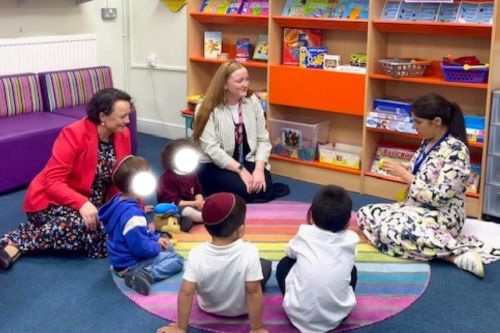Minister sees benefits of investment in Earlier support for speech and language

06 Jun 2025
Minister for School Standards, Catherine McKinnell visited a school in Barnet where Whittington Health is involved in a national pilot.
Full story
Minister for School Standards Catherine McKinnell visited Hasmonean Primary School in Barnet last week. She met with colleagues from Whittington Health NHS Trust who are piloting a national speech and language support programme in alongside the London Borough of Barnet. The ‘Early Language Support for Every Child’ (ELSEC) programme helps teaching staff to identify and support children with speech and language challenges sooner and provide them with targeted support.
During the visit, as a result of the positive results of the pilot in Barnet and others nationally, she announced that up to 20,000 more children are set to benefit from ELSEC targeted support, backed by £3.4 million this year.
Developmental delays have been a growing issue since the pandemic, with more than 40,000 children waiting over 12 weeks for speech and language therapy as of June 2024.
It is particularly prevalent for children with Special Educational Needs and Disabilities (SEND) as numbers have skyrocketed nationally from 1.3 million in 2020 to 1.67 million in 2024 – with one in four of these children requiring additional help to overcome difficulties listening, understanding and talking.
These rises have been echoed locally with the numbers increasing. Across North Central London, the number of children with SEND has increased, including:
- Barnet:
The Government confirmed that the ELSEC programme will pave the way for a reformed SEND system that embeds earlier intervention and targeted support, enabling children to thrive at their mainstream school and making sure all children have the best start in life.
As part of the ELSEC programme, Speech and Language Therapy Assistants become part of the fabric of the school, working across numerous settings in their area to assist pupils aged 2-11 years old who need help with their language skills – whether that’s universal support for the whole class, or specialist 1:1 help for pupils with intensive needs.
Whittington Health NHS Trust’s Clinical Coordinator in Barnet’s ELSEC team, Georgia Roskin, said: “It can be very easy for teaching staff to identify children with significant needs but the children with mild-moderate needs often get missed, which can sadly cause long-term speech and language difficulties, and poorer outcomes.
“That’s why when we first partner with a setting, we train teaching staff to screen every single child, which assures us (and parents!) that no children go undetected.
“We work intensively within a setting for six weeks, helping to identify pupils who may need support, while also upskilling the school staff on different interventions and teaching approaches they can adopt. We then stay in regular contact, coming back into the setting every couple of months to see how they’re getting on and address any new concerns.”
Minister for School Standards, Catherine McKinnell visited Hasmonean primary school in Barnet, which has been part of the ELSEC programme since January and observed a small group intervention in one of the school’s calming environments. The activity focused on developing children’s social communication skills by engaging the children’s attention, promoting interaction and vocabulary, and making learning and communication fun.
Head of Early Years and SEN Support at Hasmonean Primary School, Jemma Brahams, said: “The ELSEC team first trained me on how to run a small group intervention for our pupils who are experiencing speech and language difficulties. The team was there to help me from the start and was always available as I got used to implementing the approach.
“The training provided on these interventions has been huge for us, as we now don’t need to wait for anyone to come into the school or go on any waiting lists – we can just take it forward straightaway. In fact, I’m now able to train other staff members in the school to deliver intervention groups.
“The impact on our pupils’ development has been really positive too. As the activity is creative and interactive, it supports the children’s speech and language development, concentration and attention – we’ve seen so much progress.”
Parent of Raphael at Hasmonean Primary school, Deborah, said: “Raphael is 4 and did not speak until recently, he only made noises which was so frustrating for him, but with interventions he has progressed amazingly. We are now hopeful that Raphael can go to Reception in September which was not an option a few months ago!
“This programme has been so impactful for my son and it is amazing to see the work being done for children like Raphael.”
Jointly funded by NHS England, ELSEC has already supported over 200 early years and primary school settings, trained over 3,000 setting staff and provided support to just over 20,000 pupils nationally so far since launching in 2023.
Minister for School Standards, Catherine McKinnell said: “ELSEC is turning this around for so many pupils – and particularly those with SEND - helping them find their voice and thrive at school and with their friends and family. This type of approach is exactly what we want to see in a reformed SEND system that delivers the support children need at the earliest stage.”
ELSEC forms one part of the government’s work testing SEND reforms through a reformulated Change Programme focused on early intervention and support in mainstream schools.
Barnet was selected as the lead local authority for the London region, working alongside Camden, Enfield and Islington to test the Department for Education initiatives as part of the Special Educational Needs and Disabilities and Alternative Provision programme.
We sometimes use Artificial Intelligence to assist us in creating content as efficiently as possible. In line with the Trust's acceptable use of AI policy, all AI generated content is checked by the communications team before it is published.

